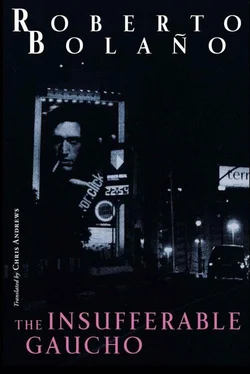What are you staring at? he demanded, brushing remnants of white powder from his nose. Pereda looked him up and down. The writer was taller and slimmer and possibly stronger than he was. What are you staring at, you rude old fool? What are you staring at? The pseudo-adolescent’s gang was looking on, following the scene as if something similar happened every night.
Pereda realized that he had grasped his knife, and let himself go. He took a step forward and, without anyone noticing that he was armed, planted the point of the blade, though not deeply, in his opponent’s groin. Later, he would remember the look of surprise on the writer’s face, in which terror was blended with something like reproof, and the words with which he groped for an explanation (Hey, what are you doing, you asshole?), as if there were any way to explain fever and revulsion.
I think you need a napkin, Pereda remarked in a clear strong voice, pointing at his adversary’s blood-stained crotch. Mother, said the coke-head, looking down. When he looked up again, he was surrounded by friends and colleagues, but Pereda was gone.
What should I do, the lawyer wondered as he roamed through his beloved city, finding it strange and familiar, marvelous and pathetic. Do I stay in Buenos Aires and become a champion of justice, or go back to the pampas, where I don’t belong, and try to do something useful. . I don’t know, something with the rabbits, maybe, or the locals, those poor gauchos who accept me and put up with me and never complain? The shadows of the city declined to provide an answer. Keeping quiet, as usual, Pereda thought reproachfully. But when the day began to dawn, he decided to go back.
for Robert Amutio and Chris Andrews
My name is José, though people call me Pepe, and some, usually those who don’t know me well, or with whom I’m not on familiar terms, call me Pepe the Cop. Pepe is a benign, well-meaning, genial diminutive, neither scornful nor flattering, and yet the appellation does imply, if I can put it this way, a certain affection, something more than detached respect. Then there’s the other name, the alias, the tail or the hump that I lug around cheerfully, without taking offense, partly because it’s never or almost never used in my presence. Pepe the Cop: it’s like tossing affection and fear, desire and abuse into the same dark bag. Where does the word cop come from? It comes from copper , he who cops or caps, that is captures, takes hold of, nabs, in other words, he who has the authority to arrest and hold, who doesn’t have to answer to anyone, who has impunity . And they call me Pepe the Cop because that’s exactly what I am; it’s a job like any other, but few people are prepared to take it on. If I’d known what I know now when I joined the force, I wouldn’t have been prepared to take it on either. What made me join the police force? That’s a question I’ve often asked myself, especially lately, and I can’t come up with a convincing answer.
I was probably dimmer than most in my youth. Maybe I was disappointed in love (though I can’t actually recall being in love at the time), or maybe it was fate; maybe I realized I was different, and looked for a solitary job, a job that would allow me to spend hour after hour in the most absolute solitude, but would, at the same time, be of some practical use, so I wouldn’t be a burden on anyone.
In any case, there was a vacancy for a police officer and I applied and the bosses took a look at me, and in less than half a minute the job was mine. One of them at least, and maybe the others as well, already knew that I was one of Josephine the Singer’s nephews, although they were careful not to go spreading it around. My brothers and cousins — the other nephews — were normal in every way, and happy. I was happy too in my way, but it was obvious that I was related to Josephine, that I belonged to her line. Maybe that influenced the bosses’ decision to give me the job. Or not — maybe I was just the first to apply. Maybe they thought no one else would, and if they made me wait, I’d change my mind. I really can’t say. All I know for sure is that I joined the force and from the very first day I spent my time wandering through the sewers, sometimes the main ones, where the water flows, sometimes the branch sewers, where we are constantly digging tunnels to gain access to new food sources or provide escape routes or link up with labyrinths that seem, at first glance, to serve no purpose, and yet all those byways go to make up the network in which our people circulate and survive.
Sometimes, partly because it was one of my duties and partly because I was bored, I’d leave the main sewers and the branch ones too and go into the dead sewers, conduits frequented only by our explorers and traders, usually on their own, but occasionally accompanied by their spouses and obedient offspring. There was nothing in there, as a rule, just terrifying noises, but sometimes, as I made my way cautiously through that hostile territory, I would come across the body of an explorer or the bodies of a trader and his young children. In the early days, when I was still raw, those discoveries terrified me; I would be so disturbed it was as if I became someone else. What I would do was carry the body out from the dead sewer to the police outpost, which was always deserted, and there I’d try to determine there the cause of death as well as I could with the means at my disposal. Then I would go to fetch the coroner and, if he was in the mood, he’d get dressed or change his clothes, grab his bag and accompany me to the outpost. Once we were there, I’d leave him alone with the corpse or the corpses and go out again. When our police officers discover a body, instead of returning to the scene of the crime, they generally make a vain effort to mix with civilians, working alongside them and participating in their conversations, but I’m different, I don’t mind going back to inspect the crime scene and look for details that might have escaped my notice, and retrace the poor victims’ steps or sniff my way, cautiously of course, back up the tunnel from which the attack had been launched.
After a few hours I’d return to the outpost and find the coroner’s note tacked to the wall. Causes of death: slit throats, loss of blood, broken necks; and there were often lacerations to the paws — our kind never give in without a fight, we struggle to the last. The killer was usually some carnivore that had strayed into the sewers, a snake, sometimes even a blind alligator. There was no point pursuing them; most died of hunger before long anyway.
When I took a break I’d seek out the company of other police officers. I met one who was very old and withered by age and work; he had known my aunt and liked to talk about her. Nobody understood Josephine, he said, but everyone loved her or pretended to, and she was happy — or pretended to be. Those words were Chinese to me, like a lot of what that old officer said. I’ve never understood music; it’s not an art that we practice, except on rare occasions. In fact, we don’t practice (and therefore don’t understand) any of the arts, really. Every now and then a rat who paints, for example, will appear in our midst, or a rat who writes poems and takes it into his head to recite them. As a general rule, we don’t make fun of those individuals. On the contrary, we pity them, because we know that they’re condemned to solitude. Why? Well, because creating works of art and contemplating them are activities in which our people as a rule are unable to take part, and the exceptions, the mavericks , are very few, so if, for example, a poet or even just a reciter of poetry comes along, it’s most unlikely that another poet or reciter will be born in the same generation, which means that the poet may never encounter the only individual capable of appreciating his efforts. Which is not to say that we won’t interrupt our daily occupations to listen to the poet or applaud him, or even move that the reciter be granted a pension. On the contrary, we do everything in our power — or rather what little we can — to provide the maverick with a simulation of understanding and affection, since we know that, fundamentally, affection is what he or she requires. Any simulation, however, collapses eventually, like a house of cards. We live in a collective, and what the collective depends on is, above all, the daily labor, the ceaseless activity of each of its members, working toward a goal that transcends our individual aspirations but is nevertheless the only guarantee of our existence as individuals.
Читать дальше












